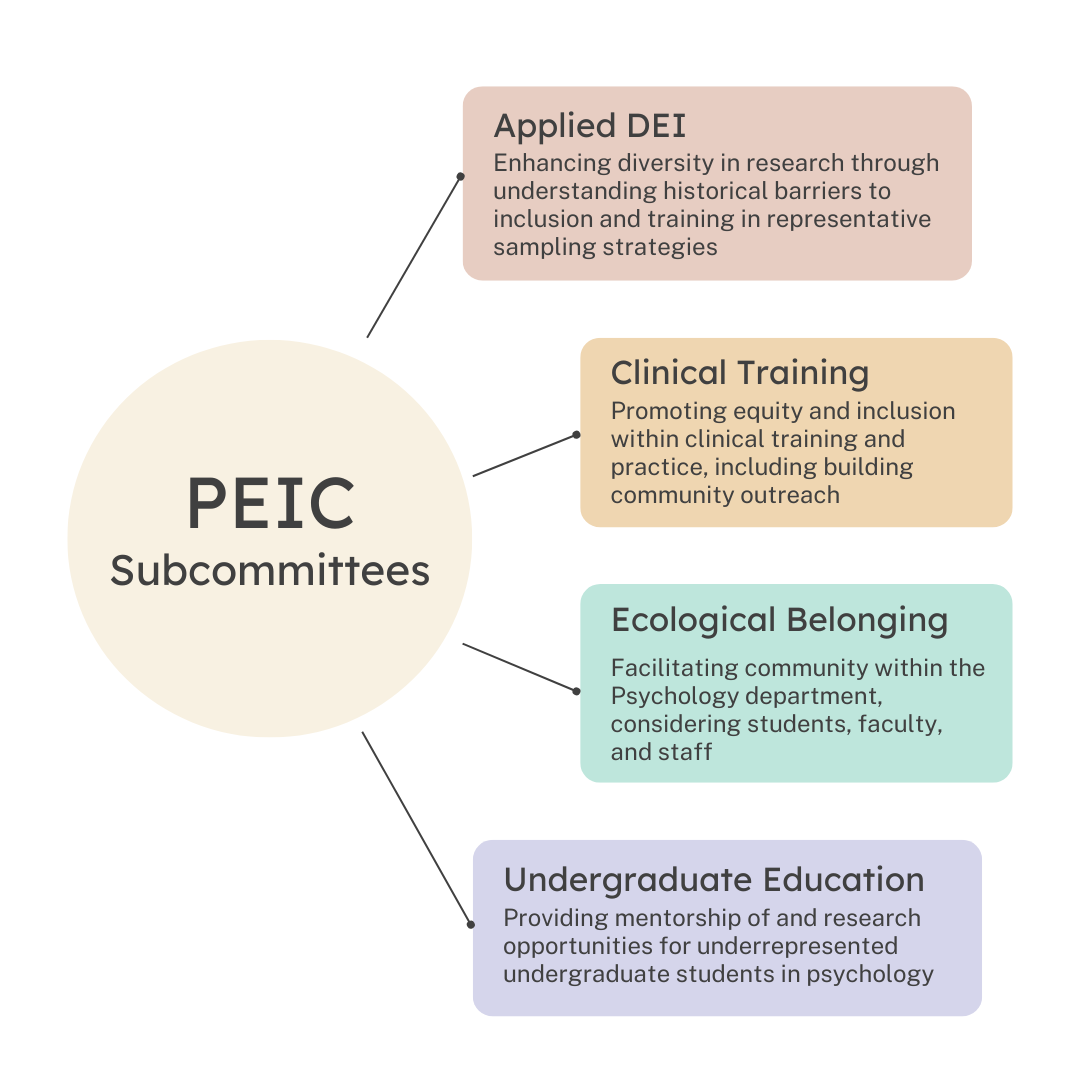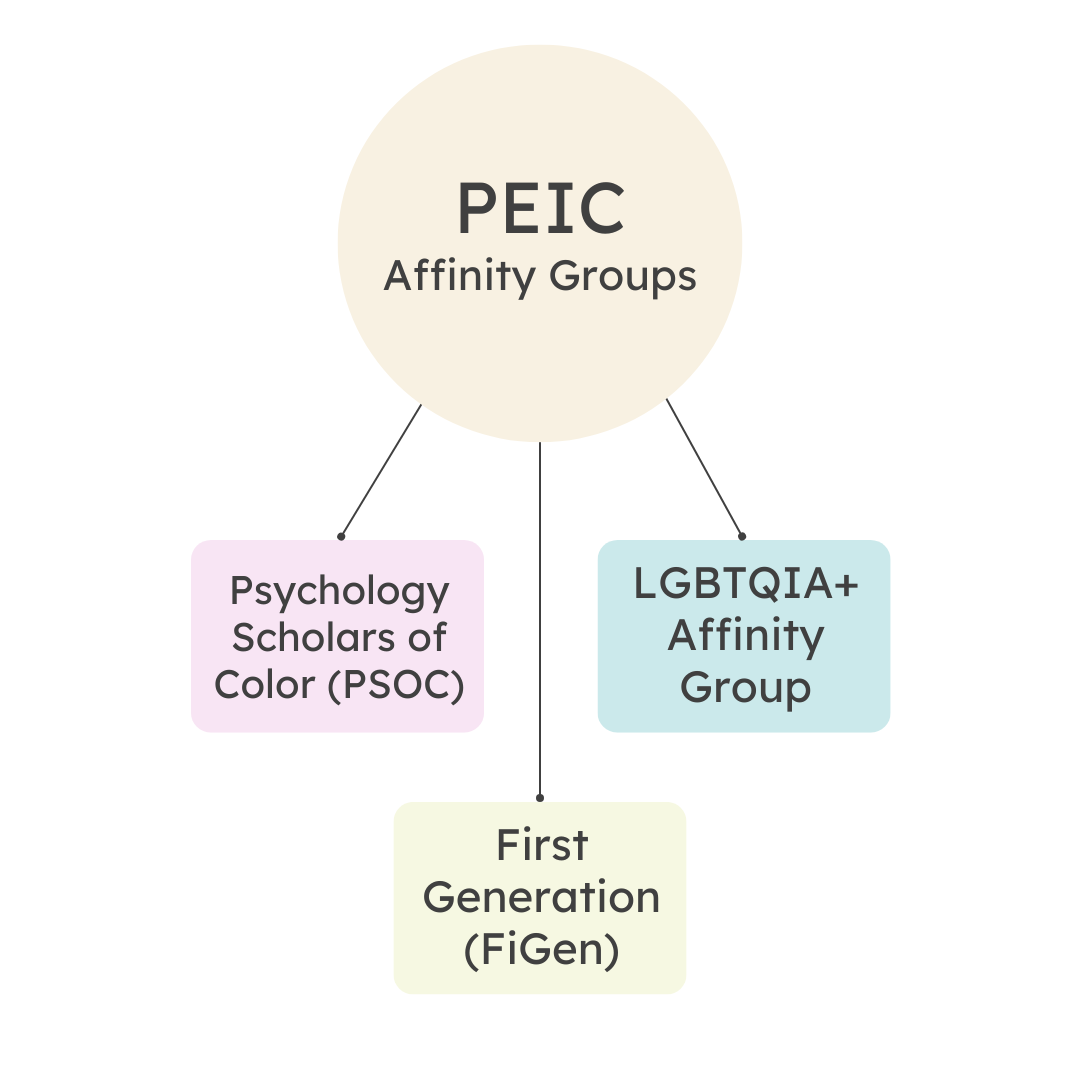PEIC: Psychology Committee on Equity, Inclusion, and Community
The Department of Psychology welcomes students of all backgrounds into our undergraduate major, graduate training programs, and research mentorship programs. Open to faculty, students, and staff, the Psychology Committee on Equity, Inclusion, and Community or "PEIC" plays a key role in building and supporting a diverse, equitable, and inclusive community of scholars. The committee is made up of five subcommittees: Undergraduate, Education & Training, Outreach, Clinical Training, and Community Groups - Psychology Scholars of Color (PSOC), Psychology First Generation (FiGen) & LGBTQIA+.
Calendar of Events
To see upcoming PEIC events, see the PEIC sub-calendar on the departmental calendar.
Contact
To learn more about PEIC and how you can become a member, please email Tim Nokes-Malach (nokes@pitt.edu) with your interest.
Mission Statement
 Psychology Committee on Equity, Inclusion, and Community at the University of Pittsburgh aims to increase equal representation, pride, inclusivity, community, and engagement with regard to traditionally underrepresented and minoritized groups within the psychological sciences research community. These groups are intentionally defined broadly and can relate to cultural backgrounds, religious, ethnic, racial, gender identity and expression, sexual orientation, citizenship, language, economic, and health factors. It is critical that we actively maintain these values into all aspects of our work including student, faculty, and staff advocacy, workplace culture and climate, recruitment and hiring, funding opportunities, research populations, and research questions. We acknowledge and appreciate the eclectic ideas that come from a diverse work environment and want to foster diversity of thought, experience, and expertise to all facets of our work. An equitable and inclusive community creates a climate that enables individuals of all backgrounds to freely express and foster their identities to support achieving meaningful work and their greatest research potential so that we may advance individual pathways to higher education and subsequently culminate scientific research of the greatest caliber. The psychology department and larger academic community have systematically marginalized certain populations resulting in an overall lack of representation and consequential support for existing minoritized groups in academia . This committee aims to subvert this lack of representation and support through achieving five main goals:
Psychology Committee on Equity, Inclusion, and Community at the University of Pittsburgh aims to increase equal representation, pride, inclusivity, community, and engagement with regard to traditionally underrepresented and minoritized groups within the psychological sciences research community. These groups are intentionally defined broadly and can relate to cultural backgrounds, religious, ethnic, racial, gender identity and expression, sexual orientation, citizenship, language, economic, and health factors. It is critical that we actively maintain these values into all aspects of our work including student, faculty, and staff advocacy, workplace culture and climate, recruitment and hiring, funding opportunities, research populations, and research questions. We acknowledge and appreciate the eclectic ideas that come from a diverse work environment and want to foster diversity of thought, experience, and expertise to all facets of our work. An equitable and inclusive community creates a climate that enables individuals of all backgrounds to freely express and foster their identities to support achieving meaningful work and their greatest research potential so that we may advance individual pathways to higher education and subsequently culminate scientific research of the greatest caliber. The psychology department and larger academic community have systematically marginalized certain populations resulting in an overall lack of representation and consequential support for existing minoritized groups in academia . This committee aims to subvert this lack of representation and support through achieving five main goals:
- Targeted mentorship of and research opportunities for underrepresented undergraduate students in psychology
- Recruitment of underrepresented graduate students, faculty, and staff to the department
- Support for underrepresented graduate students, faculty, and staff through affinity groups and financial support for affinity-related conferences/training/events for graduate students
- Training for all students, faculty, and staff surrounding issues of representation and cultural awareness and sensitivity in research, mentoring/teaching, clinical practice, and academia as a whole
- Outreach to and collaboration with other departments, organizations, and committees that share like-minded goals
As the Committee and department grow, current subcommittees will develop and maintain these goals through the implementation of initiatives. New subcommittees will be formed as needed to create and propose new ideas on these issues and topics for the Psychology department to consider. The Committee will continue to evolve and be receptive to new ideas and proposals so that these exchanges follow in the current pursuit of representing all of the graduate and undergraduate students, staff, and faculty differences and similarities that are both recognized and appreciated.
Community Groups
The Psychology Scholars of Color (PSOC) Community Group is made up of scholars who self-identify as members of racial, ethnic, and/or first-generation descent in the Psychology Department. Scholars include students, research associates, postdocs, staff, and faculty. The primary purpose of this group is to foster a safe space for connection and community. This affinity space takes place through informal gatherings and community engagement events (e.g., dinners, cultural and art events). This group is dynamic and co-created by the different and complex intersectional identities of its members. PSOC acknowledges, embraces, and supports the differences and similarities of each member as invaluable contributions to the broader academic and professional community.
The LGBTQIA+ Community Group’s primary goal of this group is to create a community of Psychology Department grad students, staff, postdocs, and faculty members who identify as members of the LGBTQIA+ community -- in other words, who self-identify as being gay, lesbian, bisexual, pansexual, transgender, queer, intersex, or any other gender or sexual minority. We hold dinners each semester for members of the LGBTQIA+ community. We also organize speakers and events to which all members of the Psychology Department are welcome.
The Psychology First Generation (FiGen) Affinity group aims to create a community for members of the department of psychology who identify as first-generation college student, first-generation graduate student, or first-generation American (i.e. you or your parents immigrated to the U.S). As part of the Psychology Department’s Equity, Inclusion, and Community Committee, this group’s primary goal is to help individuals thrive in the face of unique challenges they often confront when navigating the academic landscape. We host a range of events, including informal social outings, dinner meetings in community spaces, and virtual Zoom sessions. All members of the department who identify as "first-generation" are welcome to join.
PUGS: Psychology Partnership for Undergraduate and Graduate Students
PUGS is a program within the PEIC Undergraduate Subcommittee that partners undergraduate and graduate students for a mutually beneficial mentoring experience. Undergraduates will receive individualized mentoring and guidance from an experienced graduate student in the department. This program also hosts events for undergraduate students to gain insight into what different graduate paths in psychology look like.
Please contact Victoria Dionisos (vid79@pitt.edu) and Margaret Brehm (mvb37@pitt.edu) if you are interested in joining this program or have any questions. Short applications are typically due at the start of Fall term.
Fellowships and Awards
- For grad student fellowships and awards, members of the psychology department should see Kennynet (Intranet) / Psychology Pages / Grad Student Page.
- For undergrad scholarships, fellowships and awards, see this page.
- Hot Metal Bridge Post-Bac Program. Each year the Department of Psychology typically has 3 or 4 post-bac students participating in Pitt's Hot Metal Bridge Program. This program provides two semesters of funding and training for students from groups traditionally underrepresented in psychology, to bridge the gap between an undergraduate degree and graduate school. We encourage you to consider applying! See which faculty are accepting applications for the upcoming year.